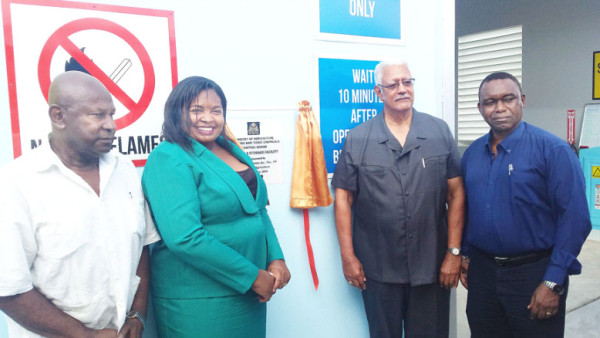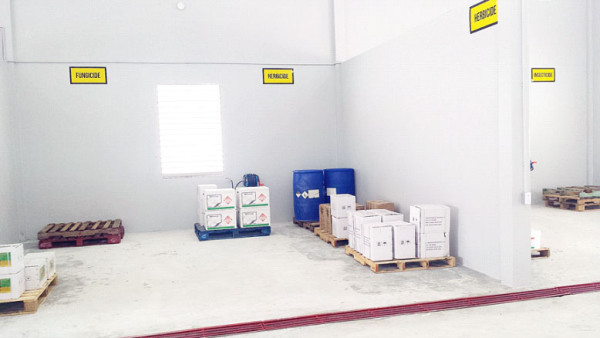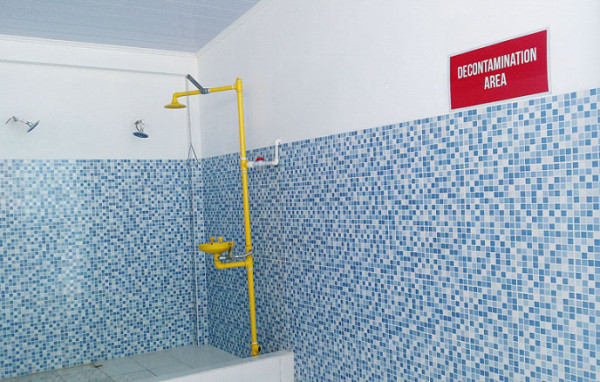The Pesticides and Toxic Chemicals Control Board (PTCCB) yesterday unveiled a $46 million chemical storage facility at the National Agriculture Research and Extension Institute at Mon Repos, where calls were made for more to be done to prevent accidental and deliberate poisonings.
The Food and Agricul-ture Organisation (FAO) Representative to Guyana Rueben Robertson likened the purchasing of pesticides by farmers to the purchasing of prescription drugs by patients at a pharmacy. Robertson noted that the pharmacy would need to be compliant with a variety of rules and regulations and likewise without a prescription the sale of certain drugs would not be allowed.
He stated that wider education is needed to ensure that importers of pesticides are equipped with the knowledge of where and how to locate antidotes when accidental or deliberate poisoning occurs.
“What is even more worrying to us is that we recognise in most of the Caricom countries that the education and promoting with respect to pesticides and their safe use are being done mainly when we have pesticide control week of activities. And that, we say, is worrying because when we consider the harmful effect and impacts of pesticides we recognise that while they are contributing to increasing production through the control of certain pests and diseases, be it on crop, be it on livestock or soil management, we have a moral responsibility to educate those who import, those who distribute, those who use, those who store on a continuous basis so that we avoid some of the ills that we now see showing their ugly heads within our members states,” Robertson added, while referring to the prevalence of pesticide use for suicides.
He said that the FAO and the regional authorities recognise that little is being done to ensure persons who will be responsible for caring for persons who fall ill due to pesticide poisoning know where to locate antidotes.
He added that every importer should be able to locate antidotes for whatever pesticides they bring into the country. He stated that the time has come to clamp down on the insidious use of pesticides and regulations and the new storage facility, he added, can effectively start that process.
Robertson also voiced concern over seeing pesticide residue on produce being sold in the markets. “…I am also speaking here from personal experience, where I go to some of the markets and I see on some of these fruits and produce pesticide residue and the same produce and products are offered for sale to
consumers. It tells us that we still have a substantial amount of work to be done and this again is a part of the education process,” he added.
He also spoke about the need for contained storage facilities that would work to alleviate any potential for damage to the environment.
Also speaking at the commissioning was Chairman of the PTCCB Dr Leslie Munroe, who emphasised the link between effective storage and the preventative measures that are taken to reduce any degradation to the environment and to people.
“We really can’t, as a board, talk to others about having proper storage when the board itself does not have proper storage,” he said.
“One of the things we are looking at right now is how pesticide are stored, the ease [with] which people have access to these products, more so now that suicide is in the air,” he added.
Agriculture Minister Noel Holder, who commissioned the facility, noted that since April Guyana has prohibited 21 more pesticides and toxic chemicals, making it one of the very few countries in the region to be in compliance with obligations under the Rotterdam Convention on the Prior Informed Consent Procedure for Certain Hazardous Chemicals and Pesticides in International Trade and the Stockholm Convention on Persistent Organic Pollutants.
Holder said “trained and certified” users can access pesticides but he also emphasised that the user has a responsibility to protect others by storing them properly. He stated that the government would like the industry to be more proactive and compliant with laws and initiatives aimed at environmentally-sound management of chemicals.
The storage facility was constructed between December, 2014 and July this year. The facility aims to ensure a place to store obsolete pesticides that the board routinely rounds up from various importers, in keeping with FAO storage regulations.








